- Home
- Janice Kay Johnson
Someone Like Her Page 6
Someone Like Her Read online
Page 6
They walked in silence then, Lucy nodding at passersby whom she knew. She was very conscious that everyone was noticing them, wondering where they were going and why.
It was lowering to know that nobody would speculate, even for a minute, that Lucy Peterson had snagged herself a handsome new man. If she’d been Samantha, that’s exactly what they would be thinking. But she knew all too well what they thought about her. Poor Lucy would certainly get married someday, she was such a nice young woman and a good cook, too, but of course her husband would be a local boy, not anyone truly exciting. Because she wasn’t exciting.
No, today they were staring because they’d heard Adrian had come to town. People were obviously dying to know why an obviously wealthy attorney’s mother had been homeless. As far as Lucy knew, she was the only person he’d talked to at all about his family history, and despite her mixed feelings about him, she would keep to herself everything he’d told her. At least until he and the hat lady were gone, and there was no reason that townspeople couldn’t gossip to their hearts’ content.
The library was a block off the main street, built just four years back. When Lucy was growing up, the library had been on the second story of an aging granite-block municipal building, which meant it wasn’t accessible to anyone who couldn’t climb the stairs. The room, cold in winter and hot in the summer, had only been about six hundred square feet. Since the new building opened, the collection had tripled and the library even had a meeting room for public use. The land it stood on was donated, and every cent spent on raising the building had been donated. Middleton was proud of its library. If Adrian sneered, Lucy was prepared to turn around and head right back to the café. She wouldn’t waste another second on him.
But when they walked in he actually looked mildly impressed. “Wouldn’t have thought you had the population to support a library this size.”
Before she could answer, Wendy spotted them from the information desk. She rose to her feet as they approached. “Lucy! I never see you on Saturdays!”
“I brought the hat lady’s son to meet you. I was hoping you’d have a few minutes to talk about her. Wendy Monsey, this is Adrian Rutledge.”
They shook hands, Wendy looking him over with interest, and she suggested they go to her office. The fact that she had an office was one of the things she appreciated most about the new library.
Wendy was about Lucy’s age, beanpole tall and skinny, with curly dark hair that tended to frizz during the incessantly rainy winter. They’d become friends right away when Glenn brought her home to Middleton. Wendy had a master’s degree from the University of Washington and had been working in the Yakima public library system before coming here. She was energetic, and enthusiastic, and full of ideas.
Her office wasn’t very big, and she had to lift bags of books—“Donations,” she explained—from one of the chairs before they could sit.
Lucy wished the limited space didn’t force her to sit quite so close to Adrian. Their shoulders brushed as they faced Wendy across her desk.
“I understand you let my mother check out books even though she didn’t have an address,” Adrian said.
“She was probably my favorite patron,” Wendy explained. “I set aside books for her, and when she brought them back we’d talk about them. Not that many people have the time or interest in doing that. I mean, half the patrons only come in here when they need a book on writing résumés, or an automobile repair manual. Or they read nothing but mysteries, or check out only gardening books, or…”
Lucy’s cheeks warmed just a little. She had a couple of gardening books checked out most of the time. She especially enjoyed the ones with lots of gorgeous photographs.
“What did she read?” Adrian asked, leaning forward slightly. “I’ve tried to imagine how a woman who thought she was an impoverished young lady of good breeding and small fortune in Regency England coped with modern life all around her.”
Lucy looked at him sharply. Had he actually read Jane Austen? She wouldn’t have expected that.
“She had all these supposed identities, but she was still herself, too. I don’t know how to explain.”
Lucy agreed, “It’s as if the identity of the day was only on the surface. She’d choose different hats, and her accent would change, and even her mannerisms, but…she was always the hat lady. I could talk about gardens with her no matter whether she was Queen Elizabeth or Elizabeth Taylor. Queen Elizabeth never missed a garage sale any more than Eliza Doolittle would. Something essential stayed the same.”
Wendy nodded. “And she actually lived in the here and now. But only sort of. She didn’t read, oh, about politics or terrorism or anything really current. I’m not even sure how much she understood local politics or the school bond issues. She liked to read fiction and poetry and biographies. Anything Arthurian, although she always said The Once and Future King was the best. She did love mysteries, mostly the old ones. Josephine Tey, and Dorothy Sayers’s Lord Peter Wimsey series, especially after he met Harriet Vane. Gaudy Night and Busman’s Honeymoon.”
They could both see his bewilderment.
“I hooked her on some modern authors, too, though. Elizabeth George—”
“That figures,” he muttered.
Wendy laughed. “She probably was more willing to try the books because of the author’s name. But she liked Martha Grimes and P. D. James, too. Oh, and Ellis Peters’s Brother Cadfael mysteries, although I guess we can’t exactly call Ellis Peters modern.” She talked about how gifted his mother was at finding the tiniest of plot flaws, and how when she really loved a book she’d bring it back with passages marked. “She’d read them aloud. She did it so beautifully, as if she were on stage. I could see how much pleasure she took in language.”
Adrian stirred. “She read aloud to me when I was little.” His voice was strange, as though the memories weren’t entirely welcome. “Even later, when I was reading myself. At first, books just a little beyond me, like The Wind in the Willows. Once I was eight or nine, I’d have died before I told anyone else, but she still read a chapter to me most nights. By then, it was stuff that was way beyond my reading level. Those books by Mary Renault about Theseus.”
“The King Must Die,” the librarian murmured.
“Yeah. I loved those. When she left—” he cleared his throat. “We finished The Hobbit the night before I left to visit my grandparents. She said we’d start The Fellowship of the Ring when I got home.”
Heart jumping into her throat, Lucy swung to face him. “She had it! Just that one! I thought it was strange, because I didn’t find the other two. It’s only a paperback, and the pages are yellowing, the way older paperbacks always are. But…she must have kept it.”
“She’d…already bought it. I remember thinking how fat it was and wondering how long it would take us to read it. But I really liked The Hobbit, so I was okay with the idea.”
“Did you ever read The Lord of the Rings?” Lucy asked softly.
“No.” His voice was harsh. “Skipped the movies, too.”
“She never did, either.” Wendy sounded extraordinarily sad. “I suggested them once. She said no, she was waiting.”
His hands tightened on the arms of the chair. Lucy saw his knuckles go white. “Waiting? Did she say for what?”
Wendy shook her head. “Her voice trailed off and she looked so bewildered and unhappy I started talking about something else as if I hadn’t noticed.”
They sat silent for a moment.
Lucy and Adrian left shortly thereafter. They had reached the sidewalk when he stopped suddenly. “Can you give me a minute?”
A wrought-iron bench had been placed there for library patrons waiting for a ride. He sank onto it as if his knees had given out.
“Of course.” Watching him worriedly, she sat, too.
He rested his elbows on his knees and hung his head. He’d obviously been more shaken by talking about his mother than she’d realized.
A little shocked that he was
letting her see him so agitated, Lucy waited.
After a minute, Adrian sighed and straightened. “I’ve forgotten so much.”
“Most of us put away things from our childhood.”
“I’d come pretty close to putting it all away.” He didn’t look at her. “Dad didn’t talk about her. He didn’t like it when I tried. Without a sister or brother…”
“You had no one to…to help you keep her alive.”
“My grandparents, of course. But after that summer I only flew up there a couple of times for shorter visits. I think Dad would have cut Maman and Grandpère off all together if they hadn’t been insistent.”
Her heart wrung, Lucy said, “But you do remember. You just…haven’t let yourself.”
“Yeah. I suppose that’s it.” He turned his head at last, his attempt at a smile wry and far from happy. “You’re dunking me in the deep end.”
“If you’d rather not—”
“No, you’re right. I’m here. Later, I’ll regret it if I don’t talk to people who knew her. Especially if—”
His mother died without ever opening her eyes and knowing him.
“She knew she had a son,” Lucy told him. “She mentioned you several times. As if you were so wound into a memory she couldn’t forget you. And then she’d get this look on her face.” She fell silent for a moment. “I thought…I assumed her little boy had died. So I never pressed her.”
“You thought her grief was what derailed her.”
“Um…something like that.”
His eyes narrowed. “And that made you even madder, when you discovered I was alive and well.”
She couldn’t seem to look away from him. “I don’t know,” she said honestly. “Maybe.”
Once again his mouth twisted and Adrian turned his head abruptly to stare across the street again. “I can’t even blame you.”
“I’m sorry,” she whispered.
“About?”
“Misjudging you.”
He met her gaze again, his face unreadable. “Are you so sure yet that you did?”
Lucy nodded, the movement jerky. “Pretty sure.”
After a moment of searching her face, he said, “Thank you for that, then.” He stood and held out a hand. “I know you don’t have all afternoon. Shall we move on?”
Lucy stared at his hand, absurdly afraid that, if she laid hers in it, she would be sorry. Touching him might be dangerous to her peace of mind.
But of course she had no choice, unless she wanted to insult him, so she took his hand and let him pull her to her feet.
His grip was firm and warm and strong, his hand big enough to entirely engulf hers. Once she was standing, facing him, he seemed reluctant to release her. When he did, her fingers curled into a fist and she tucked her hand behind her back.
“I am running out of time,” she said, trying to sound unaffected. “I was thinking, why don’t I introduce you to Cindy and leave you to talk to her? And then you might go up to Safeway and ask for the manager. George did more for your mother than anyone. You haven’t run into him at the hospital, have you? I know he’d be glad to talk to you.”
A couple of vertical lines appeared between Adrian’s dark eyebrows. “When will I see you again?”
He sounded…perturbed. As though he would miss her.
I’m in trouble, she thought dizzily, and knew she wasn’t smart enough to keep herself out of it.
Before she could think better of it, Lucy heard herself say, “We could go to church tomorrow. Was your mother Catholic? She seemed drawn to Saint Mary’s.”
“She was raised in the Catholic church.” His face tightened. “I have a vague memory of going to church with her sometimes when I was little. My father didn’t approve.”
Of course he wouldn’t have, Lucy thought uncharitably. For the first time in her life, she was glad someone was dead.
Adrian studied her. “Do you mind going to a service at Saint Mary’s?”
Lucy shook her head.
“What time?”
“Let’s go to the second service at nine. That way Father Joseph might have time afterward to talk to us.”
At some point they had started walking without her realizing.
When Adrian said nothing, she stole a look at him. “I have your mother’s things at home. Maybe after church you can come and get them.” In a rush she finished, “I can make us lunch.”
“Is the café not open tomorrow?”
“No. It’s closed on Sunday and Monday. For my sanity.”
They’d reached the main street and had to pause while cars passed before crossing. Once there was a break, he put a hand on her back as if the protective gesture was as natural to him as breathing.
“That sounds good,” he said, stopping on the sidewalk in front of the Hair Do to meet her eyes. “Thank you, Lucy Peterson. For everything.”
Flustered, she argued, “It’s…not so much.”
“Yes. It is.” He held open the door to the hair salon. “After you.”
Hoping she wasn’t blushing furiously, Lucy went in.
CHAPTER FIVE
ADRIAN DID NOT GO to the café for dinner. He dined on a surprisingly good filet mignon and baked potato at the Steak House, where not a soul evinced any sign of knowing who he was. He had bought a newspaper earlier in the day and not had a chance to read beyond the front page headlines; now he read while he ate, discovering that the Mariners had lost to Texas, that the Seattle city council had another ludicrous idea for replacing the Alaska Way Viaduct, and that the ferry he had ridden over on had been dry-docked for repairs and replaced temporarily with a smaller one, meaning long lines at the terminals during school spring breaks.
By the time he folded up the newspaper and paid, he couldn’t remember much of what he’d read. He hadn’t been concentrating. He’d been thinking about his afternoon and what the librarian, the hairdresser and the Safeway manager had told him about his mother.
He wished Lucy had gone with him to the latter two meetings. Neither Cindy nor George had relaxed with him as readily as they would have if Lucy had been there. He’d always believed he was skilled with people, but this context was different. He was an outsider. They looked at him like everyone in this damn town did, certain his mother wouldn’t have been homeless if he’d done his duty as her son.
He’d buried his guilt years ago, but now it was as if everyone in Middleton were scrabbling at the dirt with their bare hands, flinging it aside to bare the coffin enclosing all his suppressed emotions. They were doing it willfully, and, God help him, he was encouraging them.
“Crap,” he muttered, then grimaced when the passing waitress turned, startled. “Sorry.”
“We all have days like that,” she said with a comforting smile, and continued on with a tray laden with dirty dishes. The restaurant was emptying out. Apparently Middleton shut down early, even on Saturday nights.
They all had days like this? He seriously doubted it.
He went to the hospital, exchanging greetings with the same nurse that had been on last night, and went into his mother’s room, where nothing had changed.
This was the first time, Adrian realized, that he’d walked in when Lucy wasn’t here, talking or reading to his mother. Tonight, the chair—her chair—was empty. The only sound was the soft beep beep of the monitors. He wished he’d brought something to read to the woman who lay in this bed. That was pure genius on Lucy’s part. It filled the silence without requiring any real effort. He had no idea what he would have read to her, though. He hadn’t brought anything from home but work. Nothing in the Times seemed suitable, and he’d left it behind anyway.
He walked around the bed and sat in the chair. “Hi, Mom. It’s Adrian. I’m back.” Yeah, brilliant. “I had dinner at the Steak House. I’m told you ate there sometimes.” More charity, but he hadn’t asked for the manager to find out what about his mother had awakened the kind impulse. He felt battered enough by what the other people had told him.
&nbs
p; “I wonder why you picked Middleton. Did it remind you of Brookfield? It sounds like people here were pretty nice to you, so I can see why you stayed. I wish I’d known where you were, though. That you’d given me a chance.”
To do what? he wondered. Commit her to a mental hospital? What would he have done with his mother if he’d come upon her down on First Avenue in Seattle ten years ago and recognized her in the dirty, hopeless street person looking up at him from a doorway?
He had an uncomfortable feeling he would have been embarrassed. He’d have wanted to whisk her out of sight. Get her on meds and insist they be regularized until she was a normal, functioning human being.
Except that she’d never been quite normal and he’d loved her anyway. Not for the first time Adrian tried to imagine how two people as disparate as his parents had ever imagined themselves in love. Perhaps the answer was that they’d been drawn to the qualities in each other that they themselves lacked. His father had seemed solid, the very embodiment of stability and sanity, while his mother…she had been whimsical, creative and mysterious. Maybe they’d each thought they could soak up some of the other’s best qualities. If so, they’d failed. It was as if the marriage had accentuated their differences; Adrian’s father had become increasingly stern, while his mother had drifted further from the here and now and from her husband.
Adrian sat looking at her face, which seemed to have more color tonight. She could have simply been asleep. Her eyelids were traced with the pale blue lines of veins beneath the skin. As he stared, her lids quivered.
Was she trying to open her eyes? He tensed, watching, scarcely breathing for fear of missing some tiny movement. None came, and gradually he relaxed. He’d seen some reflex, no more. Or perhaps she was still capable of dreaming. If so, did her unconscious brain weave the voices she heard into those dreams?
He cleared his throat. “Today I was remembering how you read to me every night. The King Must Die and The Bull from the Sea. I went to Greece a couple of years ago. Not to Crete, but to Athens and one of the other islands. Everything I saw was colored by those books. When you get better, maybe we could go together. I’d like to see Knossos.”

 Home Deadly Home
Home Deadly Home From Father to Son
From Father to Son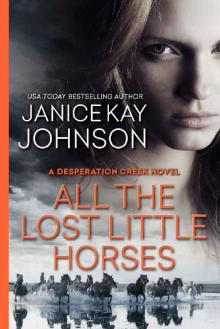 All the Lost Little Horses (A Desperation Creek Novel Book 2)
All the Lost Little Horses (A Desperation Creek Novel Book 2) Hide the Child
Hide the Child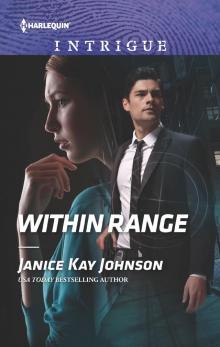 Within Range
Within Range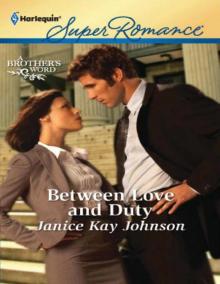 Between Love and Duty
Between Love and Duty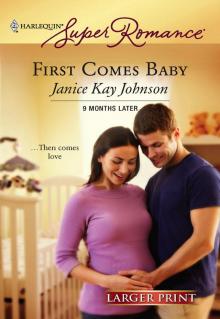 First Comes Baby
First Comes Baby Charlotte's Homecoming
Charlotte's Homecoming In A Heartbeat (HQR Superromance)
In A Heartbeat (HQR Superromance)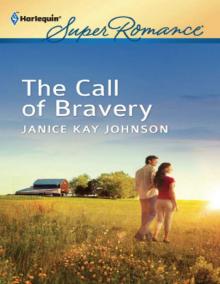 The Call of Bravery
The Call of Bravery In Hope's Shadow
In Hope's Shadow Anything for Her
Anything for Her Harlequin Superromance September 2014 - Bundle 1 of 2: This Good ManPromises Under the Peach TreeHusband by Choice
Harlequin Superromance September 2014 - Bundle 1 of 2: This Good ManPromises Under the Peach TreeHusband by Choice The Baby Agenda
The Baby Agenda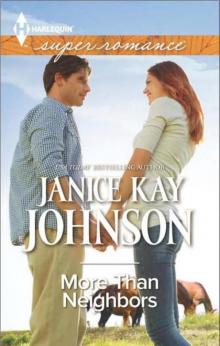 More Than Neighbors
More Than Neighbors Her Amish Protectors
Her Amish Protectors All That Remains
All That Remains Whisper of Revenge (A Cape Trouble Novel Book 4)
Whisper of Revenge (A Cape Trouble Novel Book 4)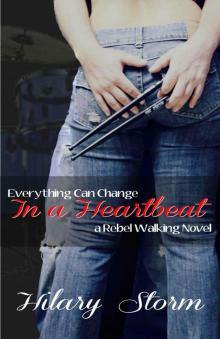 In a Heartbeat
In a Heartbeat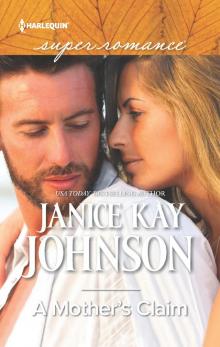 A Mother's Claim
A Mother's Claim Because of a Girl
Because of a Girl Back Against the Wall
Back Against the Wall Dangerous Waters
Dangerous Waters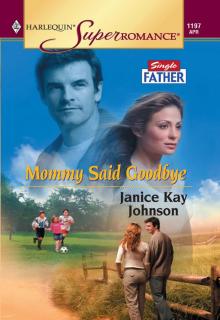 Mommy Said Goodbye
Mommy Said Goodbye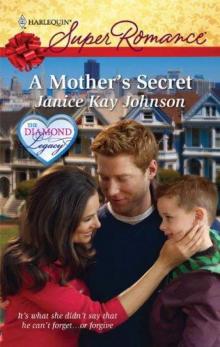 A Mother's Secret
A Mother's Secret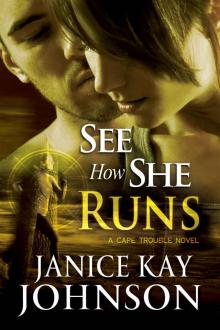 See How She Runs (A Cape Trouble Novel Book 2)
See How She Runs (A Cape Trouble Novel Book 2) Plain Refuge
Plain Refuge Bringing Maddie Home
Bringing Maddie Home For the Girls' Sake
For the Girls' Sake Through the Sheriff's Eyes
Through the Sheriff's Eyes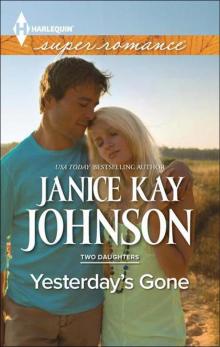 Yesterday's Gone (Two Daughters Book 1)
Yesterday's Gone (Two Daughters Book 1)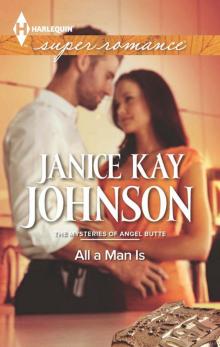 All a Man Is
All a Man Is Harlequin Superromance January 2014 - Bundle 1 of 2: Everywhere She GoesA Promise for the BabyThat Summer at the Shore
Harlequin Superromance January 2014 - Bundle 1 of 2: Everywhere She GoesA Promise for the BabyThat Summer at the Shore No Matter What
No Matter What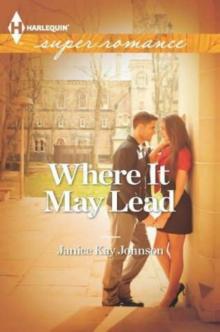 Wakefield College 01 - Where It May Lead
Wakefield College 01 - Where It May Lead Someone Like Her
Someone Like Her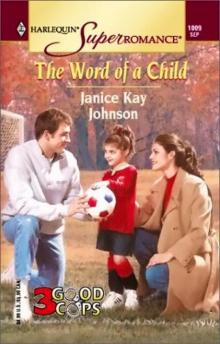 THE WORD OF A CHILD
THE WORD OF A CHILD Harlequin Superromance May 2016 Box Set
Harlequin Superromance May 2016 Box Set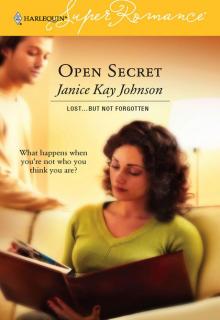 Open Secret
Open Secret The New Man
The New Man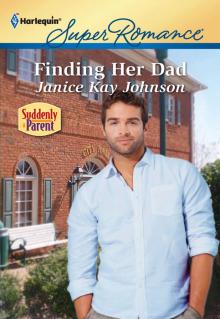 Finding Her Dad
Finding Her Dad The Perfect Mom
The Perfect Mom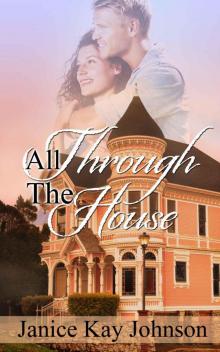 All Through The House
All Through The House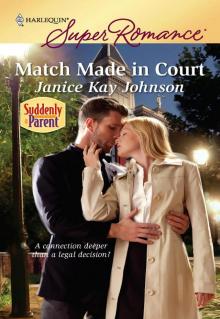 Match Made in Court
Match Made in Court Making Her Way Home
Making Her Way Home From This Day On
From This Day On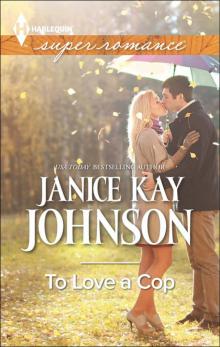 To Love a Cop
To Love a Cop The Hero's Redemption
The Hero's Redemption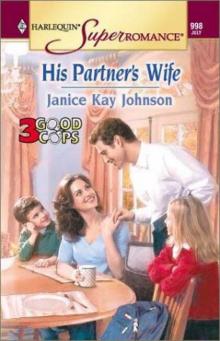 HIS PARTNER'S WIFE
HIS PARTNER'S WIFE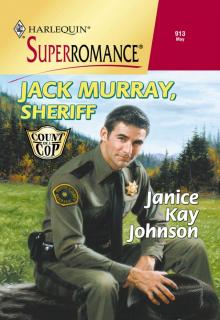 Jack Murray, Sheriff
Jack Murray, Sheriff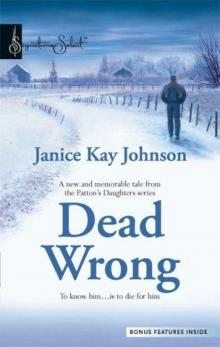 Dead Wrong
Dead Wrong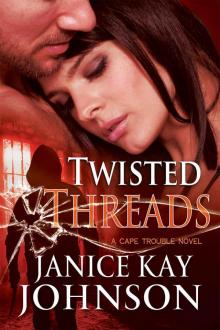 Twisted Threads (A Cape Trouble Novel Book 3)
Twisted Threads (A Cape Trouble Novel Book 3) Bone Deep
Bone Deep The Closer He Gets
The Closer He Gets With Child
With Child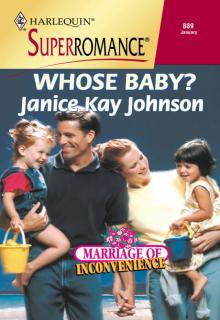 Whose Baby?
Whose Baby? Kids by Christmas
Kids by Christmas